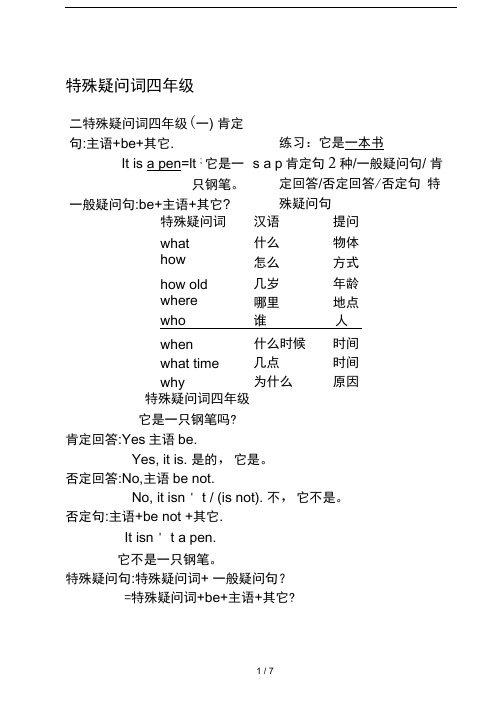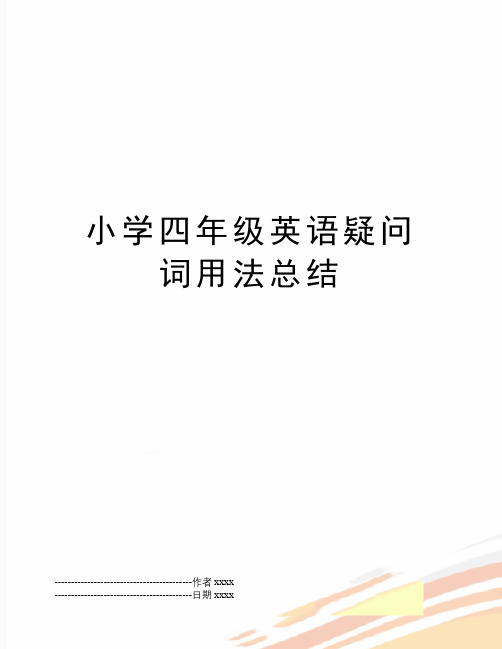新版PEP小学四年级下册第四单元特殊疑问句
- 格式:ppt
- 大小:1.31 MB
- 文档页数:23

PEP小学英语四年级下册知识点篇一:新版PEP四年级下册英语复习知识点整理PEP小学四年级英语下册复习知识点Unit 1单词:first floor 一楼 second floor 二楼teacher’s office 教师办公室library图书馆 playground 操场 puter room 计算机房 art room 美术教室music room 音乐教室 next to 紧邻;在……近旁 homework 作业 class 班;班级 forty 四十 way 方向Let’s do:Go to the library. Read a book. 去图书馆看书Go to the teachers’ office. Say hello. 去教师办公室问好Go to the playground. Play football.去操场踢足球Go to the garden. Water the flowers. 去花园浇花语音:字母组合er, wat tig sist dinn put rul知识点讲解1.介绍离自己近的事物时用this is …., 介绍离自己比较远的事物时用that is…如:This is my puter. 这是我的计算机。
That is your puter.那是你的计算机。
2.how many…?多少?用来询问物品的数量有多少,后面只能跟名词的复数形式。
如How many books do you have?你有多少本书?3.当表示有一个时,名词的前面可以用a或者an.元音前用an , 辅音前用a.如 an apple 一个苹果an orange 一个橙子a pear 一个梨 a dog 一只狗4.当用Is this…? Is that…?提问时,一般用肯定回答是:Yes, it is . 否定是: No , it isn?t.重点句型划线结构要记忆,句子要做到举一反三1. 提问“…在哪儿?”。

特殊疑问词四年级特殊疑问词 汉语 提问what 什么 物体how 怎么 方式how old 几岁 年龄where 哪里 地点who 谁 人 when 什么时候 时间what time 几点 时间why 为什么 原因特殊疑问词四年级它是一只钢笔吗?肯定回答:Yes 主语be.Yes, it is. 是的,它是。
否定回答:No,主语be not.No, it isn ' t / (is not). 不,它不是。
否定句:主语+be not +其它.It isn ' t a pen.它不是一只钢笔。
特殊疑问句:特殊疑问词+ 一般疑问句?=特殊疑问词+be+主语+其它?二特殊疑问词四年级(一) 肯定句:主语+be+其它. It is a pen=lt ; 它是一只钢笔。
一般疑问句:be+主语+其它? 练习:它是一本书s a p 肯定句2种/一般疑问句/ 肯定回答/否定回答/否定句 特殊疑问句What is it ?=What ' s it它是什么?三.一般现在时(二)肯定句:主语(非第三人称单数)+动词原型+其它.I like football.一般疑问句:Do+主语+动词原型+其它?Do you like football?肯定回答:Yes主语do.Yes, I do.否定回答:No,主语don' t/(do not). No, I don' t.否定句:主语+don‘ t动词原型+其它. I don' t like football.特殊疑问句:特殊疑问词+ 一般疑问句?=特殊疑问词+do+主语+动词原型+其它?What do you like ?练习:我喜欢米饭.肯定句/一般疑问句/肯定回答/否定回答否定句/特殊疑问句四.一般现在时(三)肯定句:主语(第三人称单数)+动词第三人称单数+其它.Sam likes rice .一般疑问句:Does+主语+动词原型+其它?Does Sam like rice?肯定回答:Yes主语does.Yes, he does.否定回答:No,主语doesn' t/(do t).No, he doesn ' t.否定句:主语+doesn' t动词原型+其它.Sam doesn ' t like rice .特殊疑问句:特殊疑问词+ 一般疑问句?=特殊疑问词+does+主语+动词原型+其它?What does Sam like?主语(第三人称单数):he/she/it/Sam/The boy/My pen动词第三人称单数:动词原形+s/es+es: go/goes do/does watch/watches have/has练习:1•我的妈妈喜欢米饭.肯定句/一般疑问句/肯定回答否定回答/否定句/特殊疑问句2.Sam踢足球. 同上.五.情态动词can:能,会肯定句:主语+can+动词原形+其它.I can swim .一般疑问句:Can +主语+动词原型+其它?Can you swim?肯定回答:Yes主语can .Yes, I can .否定回答:No,主语can'can not).No, I can't.否定句:主语+can'+动词原型+其它.I can't swim .特殊疑问句:特殊疑问词+ 一般疑问句?=特殊疑问词+can+主语+动词原型+其它?What can you do?练习:I can逊.肯定句/一般疑问句/肯定回答/否定回答否定句/特殊疑问句六.一般将来时(一)肯定句:主语+will+动词原形+其它.I will go home.='go home.一般疑问句:Will +主语+动词原型+其它?Will you go home?肯定回答:Yes主语will .Yes, I will .否定回答:No,主语won'will not).No, I won'.否定句:主语+won'+动词原型+其它.I won' go home.特殊疑问句:特殊疑问词+ 一般疑问句?=特殊疑问词+will+主语+动词原型+其它?Where will you go?I will=I ' She will=She'l时间短语:明天tomorrow/下一个next练习:我将要踢足球.肯定句/一般疑问句/肯定回答/否定回答否定句/特殊疑问句七.一般将来时(二)肯定句:主语+be going to do+其它.I am going to play chess after dinner.一般疑问句:be+主语+going to do+其它?Are you going to play chess after dinner?肯定回答:Yes主语be.Yes, I am .否定回答:No,主语be not.No, I’m not .否定句:主语+be not going to do其它.I’m not going to play chess after dinner .特殊疑问句:特殊疑问词+ 一般疑问句?=特殊疑问词+be+主语+going to do+其它?What are you going to do after dinner ?练习:我将会踢足球.肯定句/一般疑问句/肯定回答/否定回答否定句/特殊疑问句八.一般过去时(一)肯定句:主语+be过去式/(was,were)+其它.I was at home.一般疑问句:be过去式+主语+其它?Were you at home?肯定回答:Yes主语be过去式.Yes, I was.否定回答:No,主语be过去式not.No, I wasn'(was not).否定句:主语+be过去式not +其它.I wasn't at home.特殊疑问句:特殊疑问词+ 一般疑问句?=特殊疑问词+be过去式+主语+其它?Where were you?wasn't=was not , weren't=were not练习:I was at school yesterday肯定句/一般疑问句/肯定回答否定回答/否定句/特殊疑问句九.一般过去时(二)肯定句:主语+动词过去式+其它.I played football .一般疑问句:Did+主语+动词原型+其它?Did you play football? 肯定回答:Yes主语did.Yes, I did .否定回答:No,主语 didn '/(did not).No, I didn't.否定句:主语+didn '+动词原型+其它.I didn't play football .特殊疑问句:特殊疑问词+一般疑问句?=特殊疑问词+did+主语+动词原型+其它?What did you do?规则动词1. 普通动词原形+ed play--played2. 以辅音字母+y 结尾的,变y 为i+edstudy — studied carry — carried3. 以重读闭音节结尾的,双写词尾+edstop-stopped 4. 以 e 结尾的,+d live —lived phone — phoned love — loved不规则动词 have — had eat — ate have — had p do —did sing —sang take — took tell —told make — made find ——found ride — rode buy —bought then 那时/ last 上一个/ Jast night 昨天晚上/ yesterday 昨天 练习:我昨天看电视了.肯定句/一般疑问句/肯定回答否定回答/否定句/特殊疑问句十.have got 拥有肯定句:主语(非第三人称单数)+have got+其它.I 'e=l have I have got a pen.=l 'e got a pen.一般疑问句:Have +主语+got+其它?Have you got a pen? 肯定回答:Yes 主语have .go came sit —sat are — were is,am — was see — saw drink ——drank fall —fell 时间短语Yes, I have. 否定回答:No,主语haven'have not).No, I haven' 否定句:主语+haven'got + 其它.I haven'tgot a pen.特殊疑问句:特殊疑问词+ 一般疑问句?=特殊疑问词+have+主语+got+其它?What have you got?练习:我有一本书.肯定句/一般疑问句/肯定回答/否定回答/否定句/特殊疑问句十^一. has got 拥有肯定句:主语(第三人称单数)+has got+其它.Tom has got a pen .=Toms got a pen. 一般疑问句:Has +主语+got+其它?Has Tom got a pen?肯定回答:Yes主语has .Yes, he has. 否定回答:No,主语hasnt(has not).No, he has'.否定句:主语+hasn'got+其它.Tom hasntgot a pen.特殊疑问句:特殊疑问词+ 一般疑问句?=特殊疑问词+has+主语+got+其它?What has Tom got?He'=He has Sh'=She has练习:Sam有一本书.肯定句/一般疑问句/肯定回答/否定回答否定句/特殊疑问句。

人教版(PEP)四年级英语下册Unit 1-6单元知识梳理(1)Unit 1 My school重点单词:first floor一楼second floor二楼playground 操场library 图书馆art room美术教室music room 音乐教室teachers’ office教师办公室computer room计算机教室homework家庭作业class班级forty四十习惯搭配及短语on the first/second floor 在一/二楼next to...紧邻;在…...旁边go to…去…...This way,please.这边请。
welcome to…欢迎来到…...how many多少Excuse me. 打扰了。
重点句型:☆1.--Where is the teachers’ office∕art room?教师办公室∕美术教室在哪里?--It’s on the first∕second floor. 它在一楼∕二楼。
☆2.--Is this∕that a teachers’ office? 这∕那是教师办公室吗?--Yes,it is. ∕No,it isn’t. 是的,它是。
∕不,它不是。
☆3.The teachers’ office is next to the library. 教师办公室挨着图书馆。
☆4.--Do you have a library? 你们(学校)有图书馆吗?--Yes, we do. ∕No,we don’t.语法点:特殊疑问句Where’s the+事物? ……在哪里?及其回答:It’s+表地点的介词短语。
它在……一般疑问句:--Do you have+某物?你/你们有……吗?肯定回答:--Yes,I/we do.否定回答:--No,I/we don’t.Is this∕that…? 这∕那是…?肯定回答:--Yes, it is.否定回答:No, it isn’t.Unit2 What time is it?重点词汇:breakfast 早餐lunch午餐dinner 晚餐go to bed 上床睡觉English class 英语课music class音乐课PE class体育课get up 起床go home 回家go to school 上学习惯搭配及短语:hurry up快点come on快;加油just a minute稍等一会儿Breakfast is ready.早餐准备好了。


PEP小学四年级英语下册《一般疑问句和特殊疑问句知识精讲》(一)疑问句可再分为一般疑问和特殊疑问两种。
(一).一般疑问:用be或助动词或情态动词置于句首,并以肯定回答“Yes,…”,或否定回答“No,…”或相当于yes / no回答的问句称为一般疑问句.1. 含系动词be的一般疑问句的构成具体地说,am 只能跟在第一人称的单数 I 后面,are 搭配 you ,we ,they等, ,is 跟在第三人称单数 he, she ,it后面,而be 动词的基本意思:是如:This is my computer. →Is this your computer? (如遇第一人称,最好将其置换成第二人称,即将“我的”要换成“你的”)It's a map. →Is it a map?而对于一般疑问句和特殊疑问句的回答分为两种,即肯定回答和否定回答。
如:Is it your bike?肯定回答:Yes, it is.否定回答:No, it isn’t.Are they your shoes ?肯定回答:Yes, they are.否定回答:No, they are n’t.2.含助动词Do或Does的一般疑问句的构成Do与you,I,we连用,Does与he,she和it连用。
如:Do you have lunch at school?肯定回答:Yes, I do.否定回答:No, I don’t.3. 含情态动词的一般疑问句的构成一般疑问句面前人人平等:情态动词与am / is / are一样,也可直接将它们提至主语前,所以问题迎刃而解了。
如:I can do it. →Can you do it?肯定回答:Yes,I can.否定回答:No, I can’t.(记住在改成一般疑问句时应该将第一人称改成第二人称)Can I wear my new shirt today?肯定回答:Yes,you can.否定回答:No, you can’t.4. 小插曲:一般疑问句的语调大部分的一般疑问句都应读作升调(↗),并落在最后一个单词身上。

人教版小学英语精通版四年级下册Unit4 第四单元知识点精讲day 天week 周Sunday 星期日Monday 星期一Tuesday 星期二Wednesday 星期三Thursday 星期四Friday 星期五Saturday 星期六today 今天weekend 周末park 公园theme park 公园theme park 主题公园;游乐园知识点精析Lesson 191. 如何询问一周有多少天课文应用:-How many days are there in a week? 一周有多少天?-There seven. 有七天。
句型结构:问句: How many days are there in a week?答语: There are seven (days in a week)./ Seven.重点解析:问句用于询问一周有多少天。
how many意为“多少”,用于对可数事物的数量进行提问。
例:Mr. Black: How many days are there in a week? 一周有多少天?Mike: There are seven days in a week. 一周有七天。
2. in和on的用法课文应用:How many days are there in a week? 一周有多少天?(1)in 用在月份、季节前,也可用于表示“在上午/下午/晚上”等。
例如:in May在五月,in summer在夏天,in the evening在晚上。
(2)on 用在星期、日期、节日等“具体某一天”前。
例如: on Monday在星期一,on June15th在六月十五日,on Children s Day在儿童节,on that day在那天。
3. let 型祈使句课文应用:Let s go and play. 让我们去玩。
句型结构:Let+第一人称或第三人称宾格(me, us, him...)十动词原形(help, go, play…)(+其他).重点解析:let型祈使句主要有两种用法:表示“建议;劝导”。
人教PEP版四年级英语下册Unit 4 At the farm知识点归纳1. What引导的特殊疑问句(1)A:What are these? 这些是什么?B:They’re tomatoes. 它们是西红柿。
(2)A:What are those? 那些是什么?B:They’re sheep. 它们是绵羊。
2. How many引导的特殊疑问句,提问数量,用数词回答。
A:How many horses do you have? 你有多少匹马?B:Seventeen. 十七匹。
3. Are开头的一般疑问句(1)A:Are they horses? 它们是马吗?B:Yes, they are. 是的,它们是。
(2)A:Are they hens? 它们是母鸡吗?B:No, they aren’t. 不,它们不是。
(3)A:Are these potatoes? 这些是土豆吗?B:Yes,they are. 是的,它们是。
4.肯定句:谈论蔬菜和动物(1)They’re carrots. 它们是胡萝卜。
They’re ducks. 它们是鸭子。
These are sheep. 这些是绵羊。
(2)They’re so long! 它们那么长呀!The potatoes are big. 土豆很大。
They’re so cute! 它们真可爱呀!5.其他句子(1)I like tomatoes. 我喜欢西红柿。
I like potatoes. 我喜欢土豆。
(2)Let me try one. 让我尝一个。
Let me count. 让我数一数。
(3)I feel sleepy. 我觉得困了。
(4)Look at these. 看这些。
Look at the green beans. 看豆角。
(5)Try some! They’re good. 尝一些吧。
它们很好。
(6)I love to eat green beans. 我爱吃豆角。